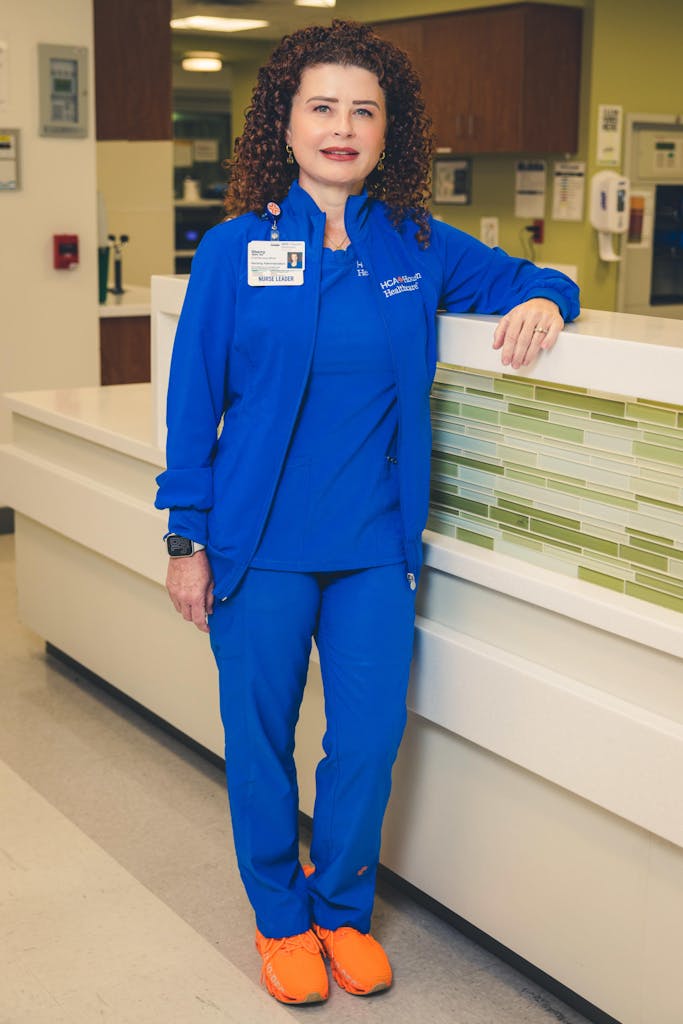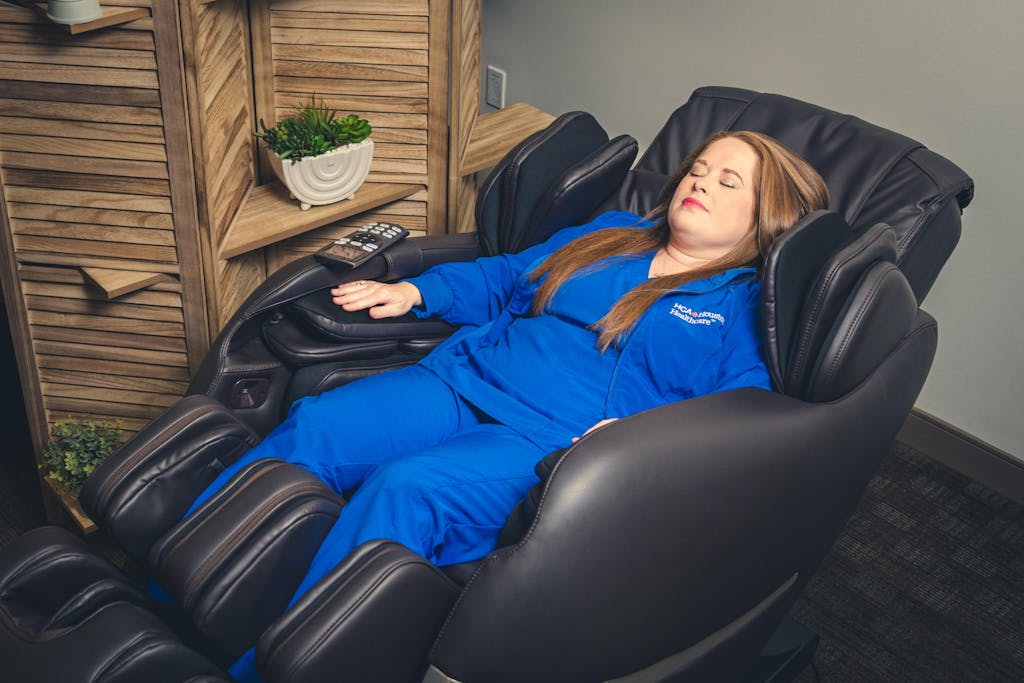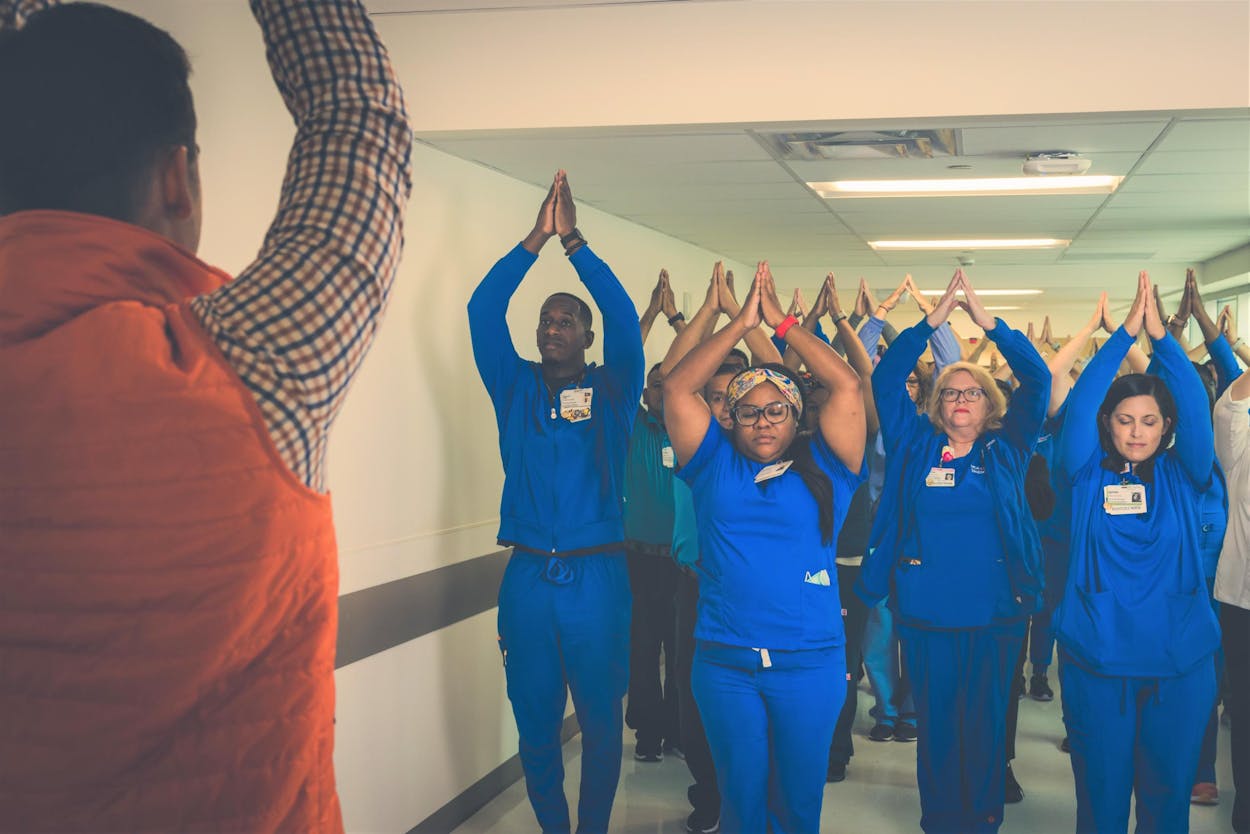Sherry Camacho still thinks about the patient’s courage.
It was the early days of the COVID-19 pandemic, and Camacho, the chief nursing officer at HCA Houston Healthcare Clear Lake, met a young man fighting the virus. She remembers his smile, his warmth, and the way he somehow kept his optimism.
“Every day, I went to check on him,” she says. “And three weeks in, he lost his life.”
Camacho is no stranger to grief. As a veteran nurse, she has spent years surrounded by loss and the pain it leaves in its wake. But this time was different.
As she explains, the sheer volume of devastation wrought by the pandemic added “an additional burden on an already stretched workforce.” On a personal level, the pain affected her at work and home more than ever.
“I would close my eyes and see this young man fighting for his life,” she says. “We started asking, ‘What is this doing to us long-term?’”
The “we” Camacho refers to includes the leadership of HCA Houston Healthcare, one of Houston’s largest family of hospitals. Amid a statewide nursing shortage and the ongoing pandemic, the organization is going to great lengths to care for the caregivers who have endured years of grief and trauma. And they’re starting with their mental health.
Informed by an in-depth research study led in partnership with the University of Houston College of Nursing, HCA Houston Healthcare has broadened its colleague resources to include mental health and wellness groups, virtual counseling, and a “chat” open at all times for questions and connections. At some HCA Houston Healthcare locations, each week even brings yoga classes, pet therapy sessions, and another Wellness Wagon Wednesday: a day when team members cycle through each unit with educational materials and five-minute de-stressor kits.

While the organization already had ample resources in place, COVID-19 catalyzed Camacho and her fellow leaders.
“We’re innovative and quick to identify what we need to put into place for our people,” she explains. “Because if we can’t take care of ourselves, we can’t care for others. It’s like the airline industry always says: ‘Before you can save someone next to you, you must put on your oxygen mask first.’”
Dr. Teresa McIntyre served as principal investigator for the University of Houston College of Nursing study titled “Occupational Health Impact of COVID-19 Response on Nurses’ Well-being and Work Outcomes.” She says she is encouraged by the steps HCA Houston Healthcare has taken to mitigate burnout: a complex problem she defines as “the chronic effects of work stress.”
“Something as serious as burnout takes intervention on the organizational and the individual levels,” Dr. McIntyre says. “Then, we have to support those actions with a strong organizational commitment. HCA Houston Healthcare is doing exactly that.”
No one knows that better than the organization’s nurses, including experienced pros like Madison Chollett. She joined HCA Houston Healthcare Clear Lake twelve years ago as a brand-new nurse, and in the days since, she has cared for patients during practically every kind of disaster. To her, the one constant is her employer’s support.
“Whether it’s a flood, a snowstorm, or a pandemic, HCA Healthcare always cares for us,” Chollett says. “As a nurse, a mom, and even a patient during the pandemic, I was grateful someone behind the scenes always cared about my well-being.”
Chollett and Camacho both say something remarkably similar about nursing. They explain that being a nurse suddenly took on a whole new meaning for their patients.
“Something as serious as burnout takes intervention on the organizational and the individual levels.”
Dr. Teresa McIntyre, University of Houston College of Nursing
Especially in the early days of the crisis, people like the young man to whom Camacho grew close couldn’t see their friends, partners, or parents. They were in complete isolation, and their nurses were their only connection to an outside world that felt increasingly far away. As Chollett says, “we became their eyes, their ears, and their families.”
Nurses are accustomed to such an immense responsibility, but as Camacho’s story shows, they can only endure so much before needing to take step back. That’s another thing that becomes clear when you talk to nurses like her and Chollett: they are indeed the heroes the world celebrated throughout the spring and summer of 2020. But in real life, heroes aren’t invincible.
Thus, Chollett found solace in the new resources provided by her employer, including the recently added “Zen lounges” at HCA Houston Healthcare Clear Lake.
The Zen lounges are dimly-lit relaxation spaces that offer full-body massage chairs alongside candles, a garden, yoga mats, and a bar for pull-ups. Constructed and customized following feedback from nurses, they are a tranquil place providing both an escape and exercise—whichever you may need while you take a break.
“It became a place for me to decompress and de-stress, and I didn’t even realize how much I needed it,” Chollett says. “Sometimes just knowing it was there as an option for me made all the difference.”
These lounges are one of the new resources that Dr. McIntyre is glad to see the organization add for its nurses.

During the pandemic, the experienced researcher and team worked with HCA Houston Healthcare Clear Lake and HCA Houston Healthcare Mainland to identify stressors, anxiety, burnout, available resources, and preferred stress management strategies among nurses caring for COVID-19 patients. Their findings paint a picture of a profession that needs supportive employers perhaps more than ever.
According to the researcher, burnout is characterized by emotional and physical exhaustion, a lack of motivation and engagement, and a lack of personal accomplishment. The overwhelming majority of nurses she surveyed were experiencing significant symptoms of burnout, despite the fact they were literally saving lives every day.
Further, over half of the nurses surveyed were depressed, with a quarter experiencing moderate to severe depression. These afflictions weren’t solely mental, either: more than 75 percent of those surveyed were experiencing high levels of pain, including sore muscles and headaches.
“All of this indicates that nurses need comprehensive support,” Dr. McIntyre says. “We need robust employee assistance programs and mental health resources, as well as small but necessary actions like uninterrupted lunch breaks.”
She isn’t the only one sounding the alarm. Earlier this year, United States Surgeon General Dr. Vivek Murthy warned that healthcare institutions could face a shortage of more than three million nurses in the next five years. Burnout, he explained, has become a crisis.
“The nation’s health depends on the well-being of our health workforce,” Dr. Murthy says. “Confronting the long-standing drivers of burnout among our health workers must be a top national priority.”
That’s why Camacho and her fellow leaders aren’t wasting any time. Of course, they’re proud of the steps they’ve taken, but they’re always looking to do even more for their people.
But Camacho says the work is far from over. HCA Houston Healthcare’s collaboration with the University of Houston has shown them how to manage burnout, and evaluations are currently underway to determine which areas can be further strengthened.
The whole point of the survey is that they wanted to hear what was going on directly from nurses, and they did. Now, the work continues.
“Nurses will always be on the frontlines,” Camacho says, “so we’ll always prioritize our nurses.”






